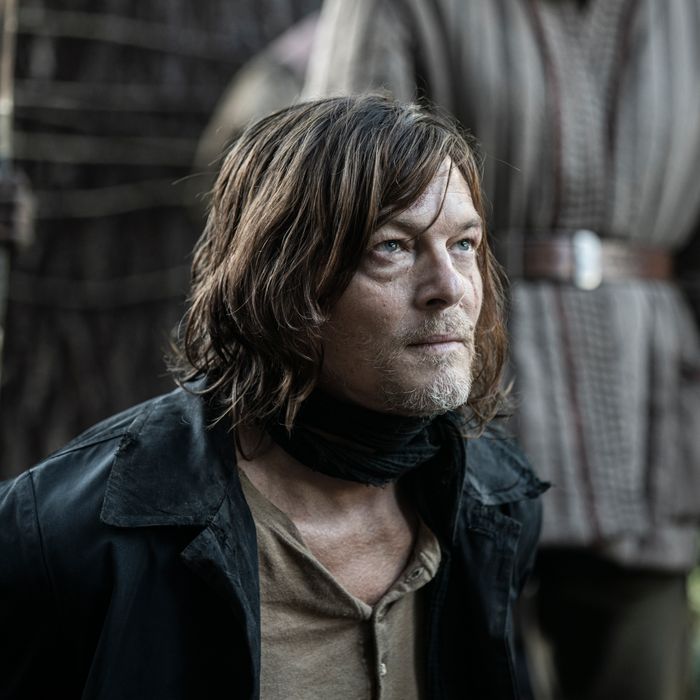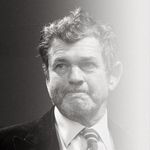
Zut alors! Bibliotheque! How the merde did The Walking Dead’s grizzliest loner and leather enthusiast Daryl Dixon end up in France? Your guess is as good as mine in AMC’s latest spinoff, The Walking Dead: Daryl Dixon, though by the end of the first episode, we can start putting some of the pieces together. With gorgeous, actual European scenery and a fearless approach to silence, this show is off to a good start in my book. It’s different! It also introduces a few themes into the Walking Dead canon that pique my interest as a fan of the show’s comic book roots and mythology: mutiny and messiah.
But first, let’s start with the man himself. The last we saw Daryl Dixon, not the first or second person you’d pick for a hero’s journey, was in the series finale of The Walking Dead. He left the Commonwealth searching for Rick, Michonne, and possibly answers about the outside world. Judith told him that he deserved a happy ending. The outside world seems to be all he’s found.
In true The Walking Dead fashion, the spinoff begins in media res with Daryl on a boat serving as a raft that washes up on the shore in the South of France. He stumbles through an abandoned seaside town, finds a boat with some errant supplies, and within a few hours has a poncho and a fish on a grill while listening to the voice of an Irish survivor whose cassette tapes he found. He doesn’t seem all that panicked that he’s in a different country. Maybe this has happened to him before in the intervening time between the TWD and now. Perhaps that’s just Daryl being Daryl.
Before starting his adventure in the great, wide somewhere, he leaves his own message on the cassette tape. “I went out looking for something, and all I found was trouble,” he says. That’s our first vague clue about how he got to the continent. Next thing we know, he’s doing his best Aragorn impression on a Tolkien-esque hike. In the next town he encounters, there’s some graffiti that reads ”pouvoir des vivants” — “pouvoir” means power and “vivants” means the living, but the preposition “des” here could mean “of,” “from,” or even “by” depending on your intention. Cool slogan! Later, he sees some less empowering graffiti that reads “attention affamés,” (“starving”) on the side of a building.
Eventually, Daryl comes across a woman named Maribelle and her father, Guillaume. Thankfully, she speaks English and seems friendly, and he rambles some kind of dad ramble in the background about the Americans and the French working together in World War II. I like that, even in a post-apocalyptic future filled with zombies, dads are still in the background rambling on about World War II. They offer to travel with him but are soon joined by two soldiers. When one of the armed men threatens Maribelle, Daryl fights back, and he and Maribelle manage to take both of them down. The partnership is short-lived, however, as father and daughter knock Daryl out and grab his supplies when he’s barely conscious.
They don’t kill him, however, because a woman approaches just as he’s passing out and takes him back with her. Enter Isabelle: A nun played by Clémence Poésy, who you may recognize from In Bruges or Harry Potter and the Goblet of Fire but appears to be in depressed Tenet mode in Daryl Dixon. She has been following him and putting up signs that read “Dieu Vous Aime,” which translates to “God Loves You.” Isabelle and her fellow nuns cauterize Daryl’s wound and set him up with a cozy sweater and some adorable suspenders.
As Daryl and Isabelle bond over their siblings and their scars, reminding them that the past is real, we learn more about the abbey. The organization is part of a larger group called The Union of Hope (Union de L’Espoir). Daryl seems suspicious, and honestly, I would be too. There are so many dystopian groups and fanatics in the TWD universe that you must keep your guard up. The fact that they’re keeping the zombified priest Pére Jean locked up doesn’t help their case. However, that doesn’t stop him from a bath, à la The Witcher.
There are no men at the convent besides a little boy named Laurent, who spots Daryl across the courtyard and immediately starts to imitate him. Then he starts talking to Daryl about math, of all things. Later, Daryl sees Laurent studying poetry with Pére Jean, who the kid says will “rise again.” The American is ready to go, but Isabelle lays out a proposition. She tells Daryl they have been waiting for him, using a drawing of Daryl that Laurent made three weeks before as evidence. She calls him the “Messenger” and claims he is destined to deliver Laurent to a base up North because a Buddhist monk called Laurent the messiah. Heavy! Daryl is not having it. As a skeptic, I’m on his side, but as a television viewer, I am intrigued. The Walking Dead had plenty of cults and one character named Jesus, but nobody in the Atlanta area ever claimed to be an actual messiah.
When the holy mission angle doesn’t work, Isabelle tries another approach with Daryl. She reminds him that he could use a French companion to find a port and a boat that would take him back to America. She says Laurent is lonely and needs to be with other children and a father figure, not in the abbey surrounded by nuns. “Staying alive’s more important,” Daryl says. I know he’s, like, refusing the call hard right now, but he’s correct!
Meanwhile, more of the military types (Isabelle refers to them as guerriers, a.k.a. warriors) learn about the death of their colleagues from Maribelle and Guillaume and figure out that the man sort-of responsible, Daryl, was taken to the abbey. The guerriers are led by a man named Codron (Romain Levi), who’s distraught at the sight of his zombified colleagues. It’s sweet, in a dark way.
As Daryl leaves the abbey, stocked up on supplies and a few “borrowed” medieval weapons, the guerriers arrive. While searching for Daryl, the soldiers find Pére Jean and put him down despite the nuns’ protests. They try to take Laurent back with them, but guess what?! Daryl returns, and a big nuns-versus-soldiers fight breaks out.
One detail I really appreciated during this whole to-do was how the abbess recognized the soldier who was ordered to kill the zombie priest. She calls him by his full name, Philippe Poulin, and begs him not to harm the man who once took his confession. What The Walking Dead has always done best, either on the anchor series or in the various spinoffs, is build a sense of community. Little details like that make it so easy to imagine how this French village has sectioned off since the world ended.
After the fight, Daryl is left with just Isabelle, Laurent, and another nun called Sylvie, who sings a song for them around the campfire. Daryl agrees to take Laurent on the mission as long as they come too and take him to a port once Laurent is safe. He also reveals to Isabelle the least amount of information about how he arrived in France. “I ran into some bad people,” he says. “They put me on a boat. It didn’t go well.” Daryl, as ever, is a man of few words.
So, Daryl Dixon has a newfound family and a crusade to complete. He also has a new enemy in Codron. But wait! There’s more. At the end of the episode, we check in with some new characters on what we must assume is the boat that charted Daryl across the Atlantic. It is docked in Le Havre, Northern France. The captain is confronted by a woman named Madame Genet, who is not pleased by whatever progress the ship’s crew is making at whatever they’re supposed to be doing. They talk about prisoners escaping, experiments, and a mutiny. Madame Genet has a doctor give her a report, and the doctor says, “Our research is largely destroyed. Whoever did this made a real mess of things for us.” So that’s obviously Daryl. The captain says he was thrown overboard. I’m sorry … Did Daryl lead a mutiny on the high seas? What in True Confessions of Charlotte Doyle? No disrespect to the killer nuns and tween messiah, but I want to see that story. Fingers crossed that we get a flashback.
These villains are scary, too, and I have honestly no idea what to expect. Maybe it’s the zombie void in my life, but I have a lot of hope about this show. Unlike The Walking Dead: Dead City, which relied on our knowledge of Maggie and Negan’s past and plopped them in a new environment that was somehow inexplicably connected to the both of them, Daryl couldn’t be farther from his past in Daryl Dixon. It’s a good dynamic. Daryl’s stand-alone episodes on The Walking Dead were always some of my favorites. For a character that really doesn’t want to deal with other people, he’s endlessly watchable.
Un Petit Plus
• The episode title, L’âme Perdue, means “the lost soul” in French.
• I’m a little upset that while Daryl was knocked out, he saw flashes of Judith and Carol but not his dog named Dog. Naming his dog “Dog” is my favorite thing about him. He’s basically Breakfast at Tiffany’s. (I promise I was attached to Dog as a concept, and a dog before The Walking Dead revealed that his previous owner and I share a name. We don’t talk about that Leah.)
• I’m intrigued by the paintings and monuments in the opening credits. The first episode took place primarily in the country. Is Daryl about to get cultured in the city? Stay tuned.
• The little “talk to the hand” gesture that Daryl does when Isabelle is telling him about his destiny? Iconique! This level of sass is why Daryl has been a fan-favorite character for over a decade.




